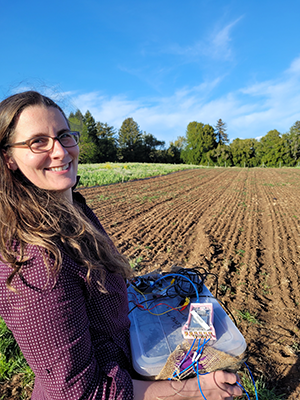Climate & Sustainability
Electrical engineer wins award to support improvement of efficient, low-cost agricultural soil sensor systems
UC Santa Cruz Assistant Professor of Electrical and Computer Engineering Colleen Josephson is a recipient of the Foundation for Food & Agriculture Research’s (FFAR) 2022 New Innovator in Food & Agriculture Research Award.

UC Santa Cruz Assistant Professor of Electrical and Computer Engineering Colleen Josephson is a recipient of the Foundation for Food & Agriculture Research’s (FFAR) 2022 New Innovator in Food & Agriculture Research Award, the organization announced.
Josephson’s project focuses on improving soil monitoring systems to address the significant water consumption and carbon footprint of the agricultural industry.
Monitoring soil properties is an effective way to decrease the consumption of resources, such as water and fertilizers, while maintaining crop yields. However, most farms do not use sensor data to guide soil inputs and irrigation, primarily because traditional sensor networks are costly and require significant labor to install and maintain.
“Having early-career support from FFAR is very exciting,” Josephson said. “It will let me spend more time guiding research, and getting results. I’m looking forward to developing our promising preliminary work into technology that could have a real impact on the world.”
Josephson is creating a new technique for agricultural soil sensing that pairs wireless underground tags with an aboveground mobile reader. This will enable completely wireless soil measurements with low maintenance and deployment costs, while achieving high accuracy and high resolution.
Josephson plans to investigate powering the soil sensing system with “mud batteries,” microbial fuel cells that harness the energy of bacteria in the soil.
FFAR’s New Innovator in Food & Agriculture Research Award provides early-career scientists with funding to conduct audacious food and agriculture research in one of their Challenge Areas, without the pressure of securing additional funding.
Josephson, whose award is $450,000, is one of ten innovators receiving a total of $8,950,028 over three years. Other innovators are studying challenges such as creating effective bee breeding strategies, developing climate-ready tree crops, and managing soilborne crop diseases.
“When scientists can spend less time searching for funding, that means more time for science,” said Saharah Moon Chapotin, FFAR executive director. “FFAR is proud to support these early career scientists as they pursue the creative research that will overcome current and future challenges to our agricultural and food systems.”